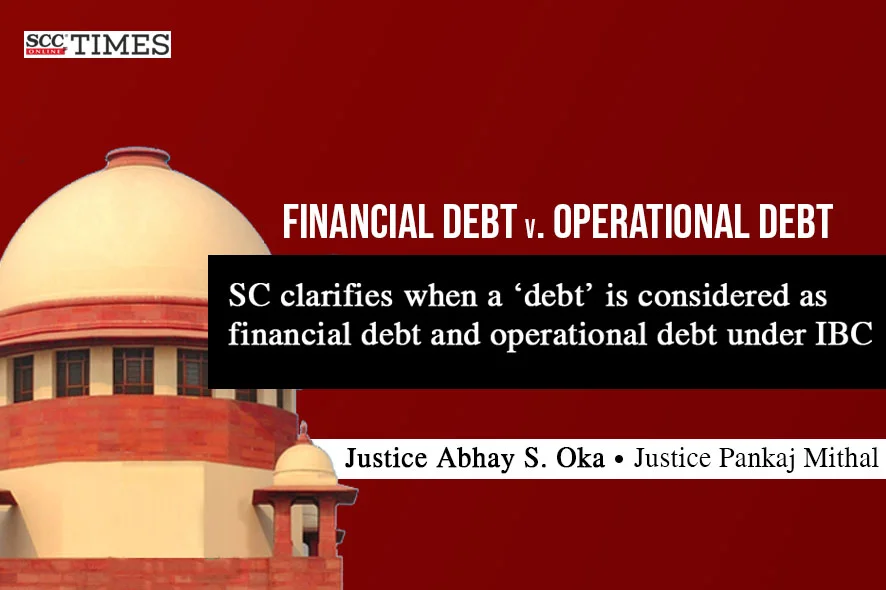Supreme Court: In a batch of civil appeals against separate judgments and orders of the National Company Law Appellate Tribunal (‘the NCLAT’), the Division Bench of Abhay S. Oka* and Pankaj Mithal, JJ., dealt with the question that, when a debt is considered as financial debt and operational debt under the Insolvency and Bankruptcy Code, 2016 (‘the IBC’). The Bench said that the test to determine whether a debt is a financial debt within the meaning of Section 5(8) is the existence of a debt along with interest, if any, which is disbursed against the consideration for the time value of money.
Factual Matrix
In the first appeal, the corporate debtor and Sach Marketing Pvt. Ltd. (‘respondent 1’) had two agreements. By the agreement/letter dated 01-04-2014, the corporate debtor appointed the respondent 1 as a ‘Sales Promoter’ to promote beer manufactured by the corporate debtor at Ranchi (Jharkhand) for twelve months on certain conditions incorporated by the corporate debtor in the said letter/agreement. The Oriental Bank of Commerce invoked the provisions of Section 7 of the IBC, against the corporate debtor, which provides for initiation of corporate insolvency resolution process (‘CIRP’) against a corporate debtor when a default has occurred. The National Company Law Tribunal (‘the NCLT’) imposed a moratorium under Section 14 of the IBC and appointed an Interim Resolution Professional (‘IRP’). Initially, the respondent 1 filed a claim with the IRP as an ‘operational creditor’, which was withdrawn, and a subsequent claim was filed with the IRP as a ‘financial creditor’. However, the claim was rejected on the ground that respondent 1 could not be considered a ‘financial creditor’. Therefore, an application was moved before the NCLT under Section 60(5) of the IBC by respondent 1 seeking a direction to the IRP to admit the claim as a ‘financial creditor’, which came to be rejected. In an appeal before the NCLAT, it was held that respondent 1 was a ‘financial creditor’ and not an ‘operational creditor’, forming the present impugned order.
In other appeals, the Resolution Professional rejected the claims of the four creditors as ‘financial creditors’. Therefore, separate applications were filed before the NCLT by invoking Section 60(5) of the IBC, which came to be rejected. In the appeals before the NCLAT, the NCLAT allowed the appeals by relying upon its judgment, which is the subject matter of challenge in the first appeal.
Analysis
The Court perused Section 5(8) of the IBC, which defines financial debt and noted that the definition includes the expression “means and includes”. The Court referred to various authorities, wherein the definition of ‘financial debt’ has been discussed at lengths. The Court emphasized that in Jaypee Infratech Ltd. Interim Resolution Professional v. Axis Bank Ltd., (2020) 8 SCC 401, it was laid that “the requirement of existence of a debt, which is disbursed against the consideration for the time value of money, in our view, remains an essential part even in respect of any of the transactions/dealings stated in clauses (a) to (i) of Section 5(8), even if it is not necessarily stated therein” and “the essential element of disbursal, and that too against the consideration for time value of money, needs to be found in the genesis of any debt before it may be treated as “financial debt” within the meaning of Section 5(8) of the Code”.
The Court said that when one party owes a debt to another and when the creditor has a claim under a written agreement/arrangement providing for rendering ‘service’, the debt is an operational debt only if the subject matter of the debt has some connection or co-relation with the ‘service’ which is the subject matter of the transaction. The Court considered it necessary to determine the real nature of the transaction on a plain reading of the agreements, and the Court noted that for promoting the beer manufactured by the Corporate debtor, only a sum of Rs. 4,000/- was being paid to the respondent 1. The Court said that a debt existed in the form of a security deposit in the said two agreements as the Court noted that Clause (10) provided for the payment of the security deposit by the respondent 1, however, the clause for the forfeiture of the security deposit did not exist. The Court explained that as there was no clause regarding the forfeiture of the security deposit o, the corporate debtor was liable to refund the security deposit after the period specified therein was over with interest @21% per annum. Since the security deposit payment had no correlation with any other clause under the agreements, as held by the NCLAT, the security deposit amounts represent debts covered by Section 3(11) of the IBC, because the right of the respondent 1 to seek a refund of the security deposit with interest is a claim within the meaning of Section 3(6) of the IBC as respondent 1 is seeking a right to payment of the deposit amount with interest.
Further, the Court analysed the applicability of Section 5(21), which defines ‘operational debt’ and explained that “operational debt means a claim in respect of the provision of goods or services including employment”, and for it to be applicable the claim must be regarding the provisions of goods or services, therefore, in the case of a contract of service, there must be a correlation between the ‘service’ agreed to be provided under the agreement and the ‘claim’. The Court said that in the matter at hand, if it is assumed that both the agreements reflected the true nature of the transaction, the only claim under the agreements which will have any connection with the services rendered by respondent 1 will be the claim of Rs.4,000/- per month as provided in clause (1) of both the agreements. Therefore, the Court said that the debt claimed by respondent 1 cannot be an operational debt.
The Court also considered the applicability of Section 5(8) to the present matter and discussed the conditions for applicability of the same, which defines ‘financial debt’. The Court explained that for applicability of Section 5(8)(f), the amount must be raised under any other transaction, and ‘any other transaction’ means a transaction which is not covered by clauses (a) to (e). It also required that the transaction must have the commercial effect of borrowing. The Court perused Section 3(33) of the IBC, which defines ‘transaction’ as including an agreement or arrangement in writing for the transfer of assets, funds, goods, etc., from or to the corporate debtor. In light of the same, the Court noted that there was an arrangement in writing for the transfer of funds to the corporate debtor, hence, the first condition incorporated in clause (f) was fulfilled. Regarding the second condition, the Court noted from the financial statements of the corporate debtor that the amount raised under both the agreements had the commercial effect of borrowing as the corporate debtor treated the said amount as borrowed from respondent 1. The Court also said that the test to determine whether a debt is a financial debt within the meaning of Section 5(8) is the existence of a debt along with interest, if any, which is disbursed against the consideration for the time value of money.
Decision
The Court agreed with the NCLAT’s decision that the amounts covered by security deposits under the agreements constituted ‘financial debt’. The Court held that considering that it is a financial debt owed by respondent 1, the Section 5(7) of the IBC was applicable, making respondent 1 a ‘financial creditor’. Therefore, the Court upheld the impugned orders.
CASE DETAILS
|
Citation: Appellants : Respondents : |
Advocates who appeared in this case For Appellants: For Respondents: |
CORAM :









